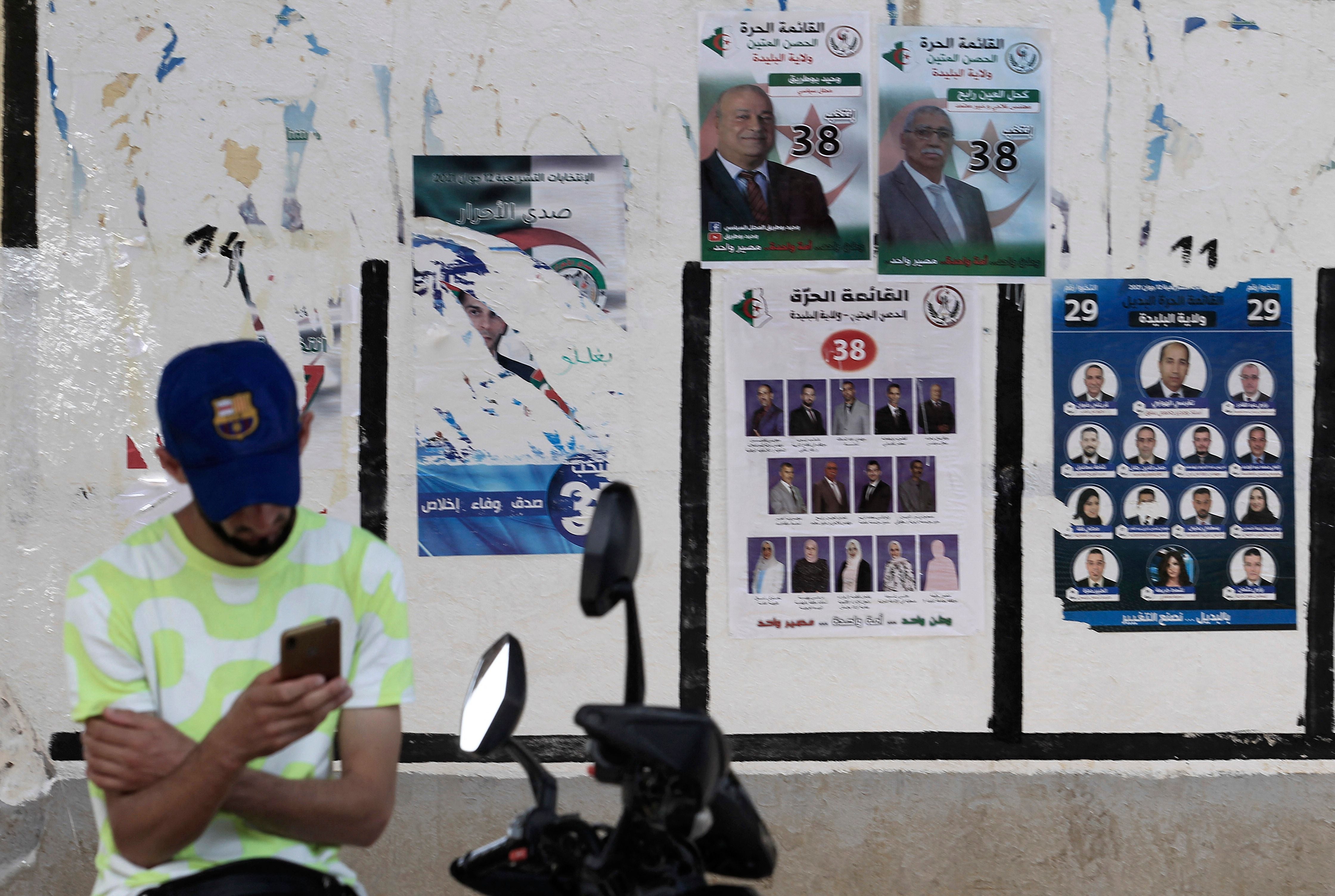‘Clear escalation’ in government repression as Algeria heads to the polls after a time of protest
Algerians have taken to the streets en masse in the past few years and on 12 June vote in elections, but few think much will change, reports Simon Speakman Cordall

The Algerian government has been accused of escalating its campaign of intimidation against pro democracy protesters ahead of legislative elections on 12 June.
In Algeria and the west, rights groups have criticised the crackdown as “unprecedented”, with a spokesperson for Human Rights Watch (HRW) telling The Independent the arrests marked a “clear escalation” in government repression.
Nevertheless, on Friday demonstrators again marched in admittedly reduced numbers across Algeria, their banners rejecting the entrenched influence of the closed circles of influence around the presidency and denouncing the forthcoming election as a deal with “the gangs of the Mafiosi”.
Since returning to the streets after a months’ long hiatus brought on by the pandemic, protesters have encountered a state in sharp contrast to the relatively conciliatory one they had dealt with before coronavirus emptied the streets.
While drawing a clear line under the first “sacred” wave of the “Hirak” protest movement, authorities are keen to present the forthcoming elections as part of a wider tranche of managed, stable reforms initiated in response to the mass protests.
All the while they strenuously avoid the central demand of Algeria’s protesters – an end to the nebulous system of army officers, trade unionists, business leaders, or pouvoir, around the presidency, which they see as having traded off its own survival against that of the country’s progression.
While peaceful, protesters’ demands drew the brutal response that has come to typify the state’s response to the Hirak since its resurgence in February.
Violence and arbitrary arrest have become commonplace, with 15 journalists reporting being arrested, with some beaten, during a single day in May.

In total, according to rights organisations, 175 activists languished in Algeria’s prisons as of late May. By some counts, upwards of 3,000 more have made their way through the increasingly congested doors of the country’s police cells since February of this year.
“Since the protests renewed, we’ve seen accusations of violent assault, assault in police cells and rape,” Ahmed Benchemsi, HRW’s communications director for the Middle East and North Africa said. “There’s little doubt we’re seeing a clear escalation in Algerian government repression,” he said.
Activist Aldja Samia Seghir described the sense of being hunted. Nobody felt safe, she said. “People are afraid to even do their shopping. Every Friday, we set up emergency cells and spend the day and even part of the night looking for our comrades in the police stations,” she told The Independent through social media.
Neither Aldja or her immediate circle of activists, like many of the leftist parties, intend to vote in June’s poll where, despite anticipated low turnout, the outcome is unclear.
Since its emergence in February 2019, the Hirak has scored unparalleled victories within Algeria.
It has unseated the country’s paraplegic octogenarian president, Abdelaziz Bouteflika, whose mooted fifth term first birthed the movement. Its calls for an end to corruption led to the arrest of many within the former president’s immediate circle.
The mass movement ushered in what the state claimed were two pivotal votes, Abdelmadjid Tebboune’s election as president in December 2019 and a constitutional referendum a year later, both of which the predominantly young protesters of the Hirak almost universally shied away from.

However, the central demand of an overhaul of the country’s closed system of governance, itself forged during the brutal struggle for independence in the early sixties and later tested to endurance during the country’s vicious civil war of the 1990s, remains unacknowledged.
Nevertheless, the reduced numbers of the Hirak’s current iteration has played into the hands of those hoping to silence it ahead of June’s election. “Two years ago, on 8 March, 10 million people came out to protest as part of the Hirak,” political analyst Zine Labadine Ghebouli said. “This year, we’ve seen, what, twenty thousand,” he said.
The protesters’ reduced presence has allowed two events to occur, Ghebouli explained. It has opened the door to Islamists, not least those of the Rachad movement, reportedly linked to the banned Islamic Salvation Front, whose disputed election victory in 1991 all but ripped the country apart over the following decade.
Their presence, amplified in the chants against the security services, harking back to Algeria’s “dark decade” of the 1990s, amplified greatly online, has essentially provided the government with the pretext to crush the avowedly secular movement.
“This idea of being against the security services and against the state finds sympathetic ears within the Hirak’s leftists,” said Ghebouli, many often already bruised from their encounters with the state. “So it all supports the government’s arguments of the Hirak having been taken over.”
All the same, attempts to distinguish between the former and the current Hirak were delusional, irrespective of its make-up, HRW’s Benchemsi explained.
Furthermore, it spoke to an archaic mindset unchanged by either the passing decades or recent events. “Nothing’s changed. The pouvoir’s still there,” he said.
Moreover, the long running tradition of ensuring the country’s power brokers had a personal pedigree dating back to the war of independence meant most were now, “upwards of 70 years old,” Benchemsi said. “They’re utterly disconnected.”
That the 12 June elections will go ahead is not disputed.
Irrespective of its short term future, the Hirak’s gains cannot be debated. However, larger questions for Algeria’s aged government remain.
With oil and gas prices maintaining the flatline they have held since 2014, Algeria’s export driven economy is rapidly running out of room for manoeuvre. And with a young population reliant upon the generous government subsidies offered in more prosperous times, the country’s sclerotic leadership has greater challenges ahead.
Join our commenting forum
Join thought-provoking conversations, follow other Independent readers and see their replies
Comments